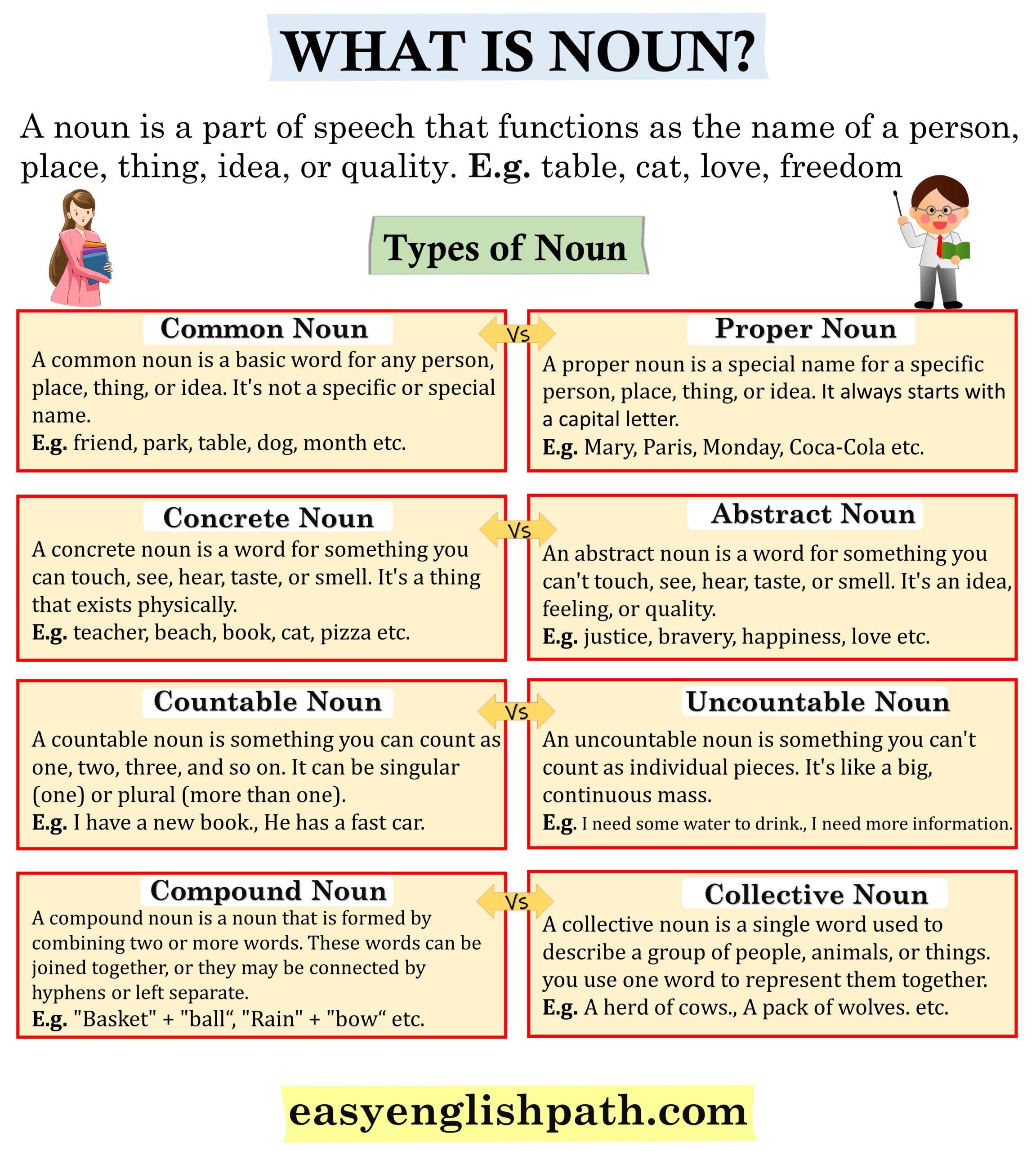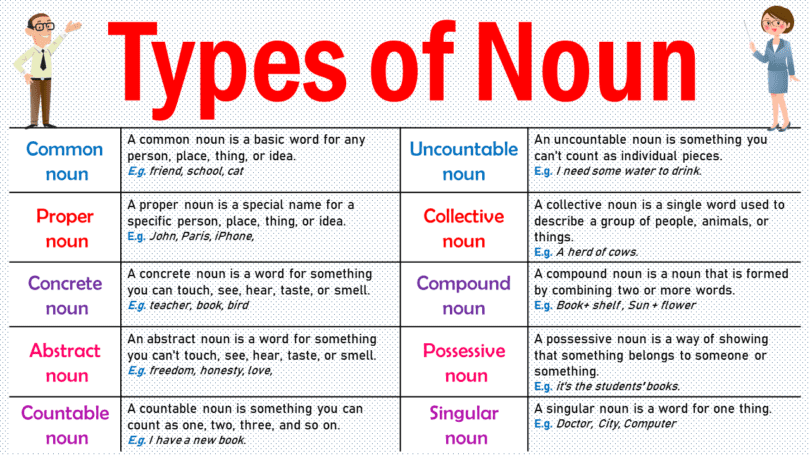What is Noun?
A noun is a word that names a person, place, thing, or idea. It’s any word you can put a or the in front of. For example, dog, Paris, and happiness ‘are all nouns because they name a specific thing, place, or concept. Nouns help us communicate by giving names to everything around us.
| Category | Examples |
|---|---|
| Things | ball, toy, bike, chair, book |
| People and Pets | mom, friend, cat, teacher, baby |
| Places | park, school, beach, home, store |
| Ideas and Feelings | love, fun, kindness, anger, playfulness |
| Groups | family, team, class, band, club |
| Actions | jump, dance, eat, read, sleep |
| Materials | paper, wood, metal, water, plastic |
| Time | day, week, moment, morning, year |
How are Nouns Used in sentences?
1. Subject Nouns:
Nouns often function as the subject of a sentence, that represents the person, place, thing, or idea that performs the action.
- Dogs bark loudly.
- John is a talented musician.
2. Object Nouns:
Nouns can also function as objects within a sentence, either as direct objects or indirect objects:
Direct Object: I enjoy reading books.
Indirect Object: She gave me a gift.
3. Object of Prepositions:
Nouns frequently follow prepositions in a sentence, they act as the object of the preposition.
- The cat is sitting on the mat.”
- She is interested in science.”
4. Noun Complements:
Nouns can function as complements, completing the meaning of a sentence. This often occurs with linking verbs.
- She became a lawyer.
- The winner is John.
5. Direct Address:
Nouns can be used in a sentence to directly address someone or something
- Please pass the salt, Alice.
- Oh, Nature, you are magnificent!
6. Gerunds:
Nouns can be formed from verbs by adding the “-ing” suffix, creating gerunds
- Swimming is my favorite activity.
- I enjoy reading.”
7. Noun Clauses:
Nouns can function as the subject or object of a clause
- What she said is true
- I understand that you are busy.”
Types of Nouns
- Common Noun
- Proper Noun
- Concrete Noun
- Abstract Noun
- Countable Noun
- Uncountable Noun
- Collective Noun
- Compound Noun
- Possessive Noun
- Plural Noun
1. Common Noun:
Common nouns are general words used to refer to categories or groups of people, places, things, or ideas. They do not refer to specific names or unique entities.
Examples of Common Nouns:
- Person: Teacher, Doctor, Friend
- Place: City, School, Park
- Thing: Book, Chair, Car
- Animal: Dog, Bird, Elephant
- Idea: Love, Honesty, Freedom
- The dog chased the cat.
- She read a book under the tree.
- He visited the park with his friends.
2. Proper Noun:
Proper nouns are words that we use to talk about specific people, places, or things. They always start with a capital letter, like names of people, cities, or companies. For example, “John,” “Paris,” and “Google” are all proper nouns because they refer to specific individuals, locations, or organizations.
Examples of Proper Nouns
- John went to New York for vacation.
- Alice works at Microsoft.
- We visited Mount Everest during our trip to Nepal.
3. Concrete Noun:
Concrete nouns are names for things that we can see, touch, hear, taste, or smell—things that exist physically.
Examples of Concrete Nouns:
- Person: Teacher, Doctor, Child
- Place: School, Park, Beach
- Thing: Table, Apple, Car
- Animal: Dog, Elephant, Cat
- Object: Phone, Chair, Book
- The table is made of wood.
- The dog chased the ball.
- She picked a beautiful flower from the garden.
4. Abstract Noun:
Abstract nouns are words that represent ideas, feelings, qualities, or states that we can’t touch or see physically. They’re things we can’t experience with our senses, but we understand them because they’re concepts.
Examples for Abstract Nouns
- Her kindness touched everyone around her.
- The beauty of the sunset was breathtaking.
- He felt a sense of freedom as he explored the open road.
5. Countable Noun:
Countable nouns are the names we use for things that we can count as individual units. We can use numbers with countable nouns, like one, two, three, etc.
Examples for Countable Nouns
- I have two cats.
- She bought three books.
- He owns five cars.
6. Uncountable Noun:
Uncountable nouns are the names we use for things that we can’t count as individual units. They are usually substances, concepts, or qualities that are considered whole or continuous.
Examples for Uncountable Nouns
- She drank some water.
- He enjoys listening to music.
- They need to buy some furniture for their new house.
7. Collective Noun:
A collective noun is a single word that is used to describe a group of people, animals, or things. Instead of naming each one separately, you use one word to represent them together.
Examples for Collective Nouns
- The team is practicing for the championship.
- A flock of birds flew overhead.
- The band played at the concert last night.
8. Compound Noun:
Compound nouns are formed by combining two or more words to create a new, These words can be joined together, or they may be connected by hyphens or left separate.
Examples for Compound Nouns
- She bought a toothbrush from the store.
- We played basketball at the park.
- The garden was full of beautiful sunflowers.
9. Possessive Noun:
Possessive nouns are used to show ownership or possession. They indicate that something belongs to someone or something else. Here are three example sentences:
Examples for Possessive Nouns
- That is Sarah’s book.
- The cat’s tail is fluffy.
- I borrowed John’s car for the weekend.
10. Plural Noun:
Plural nouns refer to more than one person, place, thing, or idea. They are generally formed by adding -s or -es to the singular noun.
Examples of Plural Nouns:
- Singular: Cat → Plural: Cats
- Singular: Bus → Plural: Buses
- Singular: Toy → Plural: Toys
- Singular: Box → Plural: Boxes
Some nouns have irregular plural forms:
- Man → Men
- Child → Children
- Foot → Feet
- Tooth → Teeth
Noun vs Pronoun
| Feature | Noun | Pronoun |
|---|---|---|
| Definition | A word that names a person, place, thing, or idea. | A word that replaces a noun to avoid repetition. |
| Examples | Ali, city, book, happiness | He, she, it, they, we, you |
| Usage | Used to introduce or refer to specific things. | Used to replace nouns that have already been mentioned. |
| Types | Common, Proper, Concrete, Abstract, Collective, Countable, Uncountable | Personal, Possessive, Reflexive, Relative, Demonstrative, Indefinite |
| Example Sentences | Ali is reading a book. The dog is barking. | He is reading a book. It is barking. |
Importance of Learning Nouns
Learning nouns is important because they help us name people, places, things, and ideas, making it easier to speak and write clearly. Without nouns, we wouldn’t be able to talk about everyday things like family, school, food, or emotions.
They help us form sentences, express thoughts, and communicate ideas effectively. Understanding nouns also improves reading, writing, and grammar skills, making English easier to learn and use in daily life.
Common Mistakes with Nouns
1. Using Singular Instead of Plural
❌ I have two book.
✅ I have two books.
2. Forgetting Capitalization for Proper Nouns
❌ I visited paris last year.
✅ I visited Paris last year.
3. Using Uncountable Nouns as Countable
❌ She gave me an advice.
✅ She gave me some advice.
4. Mixing Up Possessive and Plural Forms
❌That is my parents house.
✅ That is my parents’ house.
5. Using Article “A/An” with Uncountable Nouns
❌ I need a water.
✅ I need some water.

FAQs About Nouns
1. What is a noun?
A noun is a word that names a person, place, thing, or idea. Examples include teacher, city, book, and happiness.
2. What are the main types of nouns?
The main types of nouns are common nouns (dog, school), proper nouns (John, London), concrete nouns (table, apple), abstract nouns (love, freedom), countable nouns (cars, apples), and uncountable nouns (water, rice).
3. What is the difference between common and proper nouns?
A common noun is a general name (city, river), while a proper noun is a specific name (New York, Nile River). Proper nouns always start with a capital letter.
4. Can a noun be both singular and plural?
Yes! Singular nouns refer to one item (cat, tree), while plural nouns refer to more than one (cats, trees). Some nouns have irregular plurals, like child → children and tooth → teeth.
5. How do nouns function in a sentence?
Nouns can be the subject (The dog barks), object (I love music), or possessive form (This is Sara’s book). They play a key role in sentence structure and meaning.
You May Also Like





